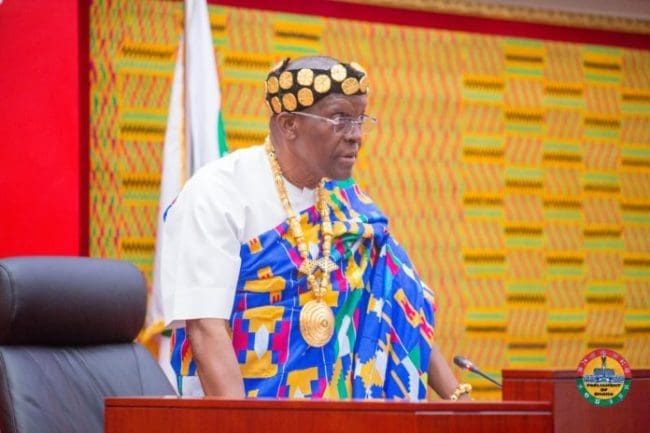Ghana’s Parliament has sent a delegation led by Speaker Alban Sumana Kingsford Bagbin to the 68th Commonwealth Parliamentary Conference in Barbados, joining lawmakers from across the 56 nation Commonwealth to deliberate on parliamentary democracy and governance challenges under the theme “The Commonwealth: A Global Partner.”
The conference, hosted by the Parliament of Barbados and the Commonwealth Parliamentary Association Barbados Branch in Bridgetown, runs from October 5 to 12, 2025, bringing together hundreds of parliamentarians, parliamentary staff, and governance experts for what represents the Commonwealth’s premier legislative gathering.
The weeklong conference provides Ghana’s delegation opportunities to engage with counterparts from developed and developing democracies on issues ranging from protecting separation of powers to strengthening parliamentary oversight and adapting legislative institutions to contemporary challenges including climate change, digital governance, and economic inequality.
The conference theme, “The Commonwealth: A Global Partner,” signals efforts to position the 2.5 billion person Commonwealth bloc as a relevant force in multilateral cooperation despite questions about the organization’s continued significance in an era dominated by other international groupings like the G20, African Union, and BRICS.
For Ghana, participation in the Commonwealth Parliamentary Conference offers networking opportunities with legislators who control budgets and set policy directions in their home countries. These connections can facilitate trade relationships, development partnerships, and knowledge sharing on legislative best practices that smaller parliamentary research departments might struggle to develop independently.
The conference agenda includes workshops where parliamentarians and global experts discuss major political and parliamentary issues, sessions on protecting democratic institutions, and debates on how legislatures can effectively check executive power without paralyzing governance. These topics carry particular resonance for African parliaments often criticized as rubber stamp institutions lacking real independence from executive control.
Ghana’s Parliament under Speaker Bagbin has positioned itself as more assertive than previous legislative sessions, occasionally clashing with the executive branch over appointments, budget approvals, and oversight responsibilities. The conference provides Bagbin’s team opportunities to learn from Commonwealth parliaments with longer traditions of robust legislative independence.
Sessions scheduled for October 8 and 9 focus specifically on “Protecting and Preserving the Separation of Powers,” addressing tensions between legislative and executive branches that affect democracies worldwide, from Westminster style parliamentary systems to presidential republics.
Beyond formal conference sessions, these gatherings facilitate informal conversations where parliamentarians exchange insights on managing coalition governments, handling controversial legislation, engaging hostile executives, and building public support for parliamentary institutions that many citizens view as disconnected from everyday concerns.
The Conference of Commonwealth Women Parliamentarians, running concurrently with the main conference, addresses gender specific challenges including political violence against women legislators, barriers to female political participation, and strategies for increasing women’s representation in male dominated legislative bodies.
India’s delegation, led by Lok Sabha Speaker Om Birla, represents the Commonwealth’s largest democracy and most populous member state. The Indian presence, alongside delegations from the United Kingdom, Canada, Australia, and major African nations, creates opportunities for Ghana to engage with parliamentary systems at vastly different scales and development levels.
The conference also serves diplomatic purposes beyond legislative capacity building. Ghana’s participation signals continued commitment to Commonwealth membership and multilateral cooperation, relationships that can prove valuable when seeking development assistance, trade preferences, or international support on issues affecting national interests.
However, critics question whether conferences like these produce meaningful reforms or primarily serve as expensive networking exercises for political elites. The test of any delegation’s participation lies in whether insights gained translate into actual parliamentary improvements back home or remain confined to conference reports that gather dust on office shelves.
For Barbados, hosting the conference provides opportunities to showcase the Caribbean nation’s parliamentary traditions and position itself as a hub for Commonwealth engagement in the region. The country recently transitioned from constitutional monarchy to republic status while remaining within the Commonwealth, a move that generates discussion about evolving relationships between member states and the British Crown.
Ghana’s delegation composition and the specific parliamentarians attending were not immediately disclosed, though such delegations typically include leadership from major political parties, committee chairs with relevant expertise, and parliamentary staff responsible for research and international relations.
The conference cost to Ghana’s Parliament, including travel, accommodation, and per diems for the delegation, represents a significant expense that critics of legislative spending often highlight as excessive. Supporters counter that international engagement strengthens Ghana’s Parliament and exposes legislators to governance innovations worth far more than the cost of attendance.
Whether Ghana’s participation yields tangible benefits for parliamentary effectiveness, legislative capacity, or democratic governance will become apparent in coming months through any reforms, procedural changes, or enhanced oversight activities that emerge from lessons learned in Barbados.
For now, the delegation’s presence at this major Commonwealth gathering signals Ghana’s continued engagement with international parliamentary networks and commitment to strengthening legislative institutions through peer learning and multilateral cooperation.
Source: newsghana.com.gh










